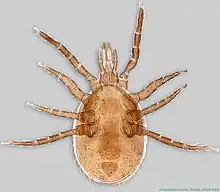| Androlaelaps casalis | |
|---|---|
 | |
| Androlaelaps casalis female magnified 40x | |
| Scientific classification | |
| Kingdom: | |
| Phylum: | |
| Class: | |
| Subclass: | |
| Order: | |
| Family: | |
| Genus: | |
| Species: | A. casalis |
| Binomial name | |
| Androlaelaps casalis (Berlese, 1887) | |
| Synonyms [1] | |
|
Iphis casalis Berlese, 1887 | |
Androlaelaps casalis, formerly known as Haemolaelaps casalis,[2] is a species of predatory mite that feeds on other mites and small invertebrates. It cannot bite or sting birds and humans because its mandibles are not designed for sucking but for predation on other mites. Because Androlaelaps casalis mites feed off parasitic mites like Dermanyssus gallinae, individuals with red colored abdomens can be found. This is not due to any blood-sucking by A. casalis but is because it has ingested blood-engorged parasitic mites. There is some evidence that it may be associated with dermatitis in humans.[3]
References
- ↑ "Species Androlaelaps casalis (Berlese, 1887)". Australian Faunal Directory. Department of the Environment, Water, Heritage and the Arts. Retrieved May 13, 2010.
- ↑ M.Sc, D. J. McKinley (1963-02-01). "The morphology and biology of Haemolaelaps casalis Berlese (Acarina; Mesostigmata)". Annals and Magazine of Natural History. 6 (62): 65–76. doi:10.1080/00222936308651326. ISSN 0374-5481.
- ↑ S. Rosen, I. Yeruham & Y. Braverman (December 2002). "Dermatitis in humans associated with the mites Pyemotes tritici, Dermanyssus gallinae, Ornithonyssus bacoti and Androlaelaps casalis in Israel". Medical and Veterinary Entomology. 16 (4): 442–444. doi:10.1046/j.1365-2915.2002.00386.x. PMID 12510897.
This article is issued from Wikipedia. The text is licensed under Creative Commons - Attribution - Sharealike. Additional terms may apply for the media files.